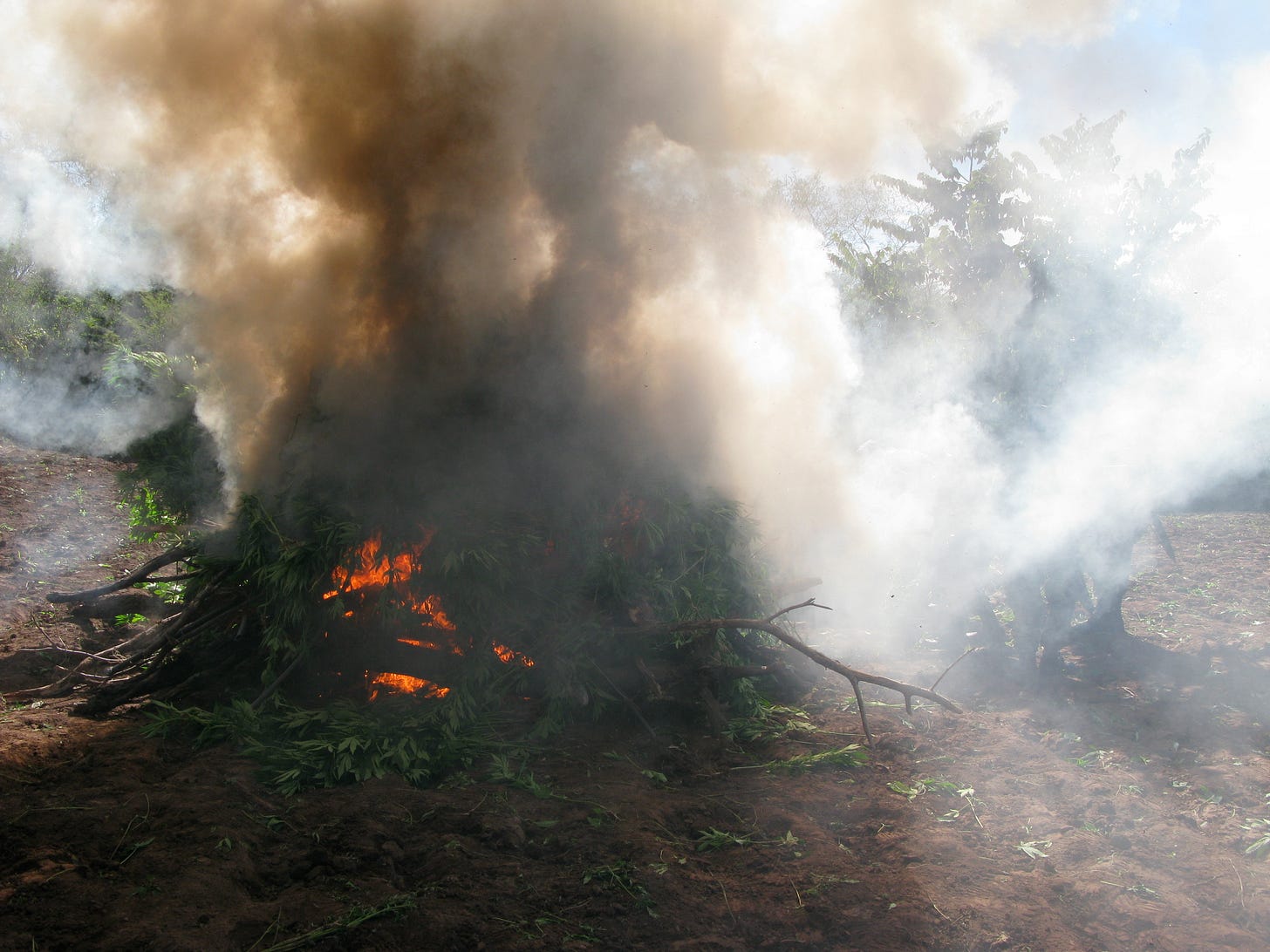U.S. Marijuana Legalization Smashed Mexico's Weed Exports - As Intended
But I was wrong. It didn't, as many of us hoped, weaken cartels
Para leer en español click aquí.
UPDATE on Nov. 6, 2025 with latest figure on states with legalized marijuana
Back in 2009, I flew on a helicopter with Mexico’s 94th Battalion from the Sinaloa capital of Culiacán to a weed plantation in the mountains of Badiraguato, the homeland of El Chapo. I was filming a TV story (clip below of a younger me) and the soldiers played along - they squatted on the ground with rifles raised for enemy fire and ripped up the marijuana to throw in a bonfire under the blazing sun. If anyone is curious, you don’t actually get stoned watching cannabis burn; it hasn’t dried out and the smoke wafts directly up to the clouds.
While army ride-alongs can be a bit of a dog and pony show, the core issue was very real. At this time, Mexican narcos trafficked copious amounts of ganja to American smokers. U.S. agents seized 3.3 million pounds (1.5 million kilos) of marijuana on the southwest border that year, the highest amount ever. With much more dope always getting through than getting nabbed, this meant Mexican traffickers were banking billions of dollars.
It seemed to me that it was crazy that the profits of pot, which was so widely consumed in the United States, were funding cartels that were unleashing such terrible bloodshed in Mexico. I joined calls to legalize weed, including in my first Op-Ed in the New York Times, on the grounds that it would weaken the cartels south of the Rio Grande.
Older journalist colleagues used to call any drug legalization “a non starter.” But the dam broke in 2012 when voters in Colorado and Washington State passed ballot initiatives to legalize marijuana for recreational use. It felt like a revolutionary moment, the first time that any place in the world had legalized cannabis since the wave of prohibition began a century earlier. (Amsterdam’s famous coffee shops operated on legal ambiguity). What’s more, Colorado and Washington went directly against the federal government and United Nations treaties. The measures could potentially be struck down.
Yet legalization not only survived but spread. States toppled like dominoes in approving recreational reefer: Alaska and Oregon in 2014; California and Nevada in 2016; New York in 2021. Marijuana is now legal for recreational use in 24 states plus D.C. and for medical use in 42.
Despite the calls of activists, the federal government under President Joe Biden did not legalize pot to fall in line with these initiatives. But it eased up on enforcement and Biden pardoned many federal marijuana offenses. More importantly, the AP broke the story that the DEA is moving to reclassify cannabis as a less dangerous drug, downgrading it to a schedule III, alongside anabolic steroids.
Like many of us hoped, this wave of legalization has decimated weed trafficking from Mexico, as the chart below shows. In fiscal year 2013 before the new laws came into effect, U.S. agents seized 2.4 million pounds of Mary Jane on the southwest border. In 2023 that hurtled down to just 61,000 - a fall of 97.5 percent.
Americans don’t want low grade Mexican mota anymore and there is no prohibition premium in trafficking it. They want high grade U.S. weed, which many can buy in dispensaries.
This all looks like a resounding success story of cutting off cartel income and saving border agents the work of chasing marijuana couriers, known as burros or donkeys, who lug it over the desert. Except it’s hard to sell the idea that anyone has been successful fighting drugs and cartels over the last decade.
Mexico has suffered its most violent period since modern records began with over 30,000 murders a year. Cartels exert more control over villages and cities and are shaking people down en-masse. And the traffickers have moved into the perilous fentanyl trade driving the worst overdose crisis the United States has ever seen with over 100,000 deaths during several years.
Back in 2012, I wrote in The Times that cannabis legalization “would inflict more financial damage than soldiers or drug agents have managed in years and substantially weaken cartels.” I have to concede that has not been the case.
In this piece, I look at how cartels have shifted their operations and how much this is or isn’t connected to the marijuana reforms. And I reflect on what we can learn from this and how we might move forward.
Sorry folks, you need to subscribe to read the rest of this story. But it’s only the price of a cuppa coffee and you get the complete archive including exclusive interviews with top players and maps of cartel territory. And now is a great time to subscribe as we will be following these issues with detailed reports you can trust as big things break in the coming months.



